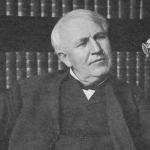Back in November 2012, Angela Buckley, a researcher and writer from Manchester, tweeted to tell us about an exciting book project she’s working on.
The book is entitled, The Real Sherlock Holmes: the Hidden Story of Jerome Caminada, and Angela wrote a fascinating article in November 2012 about her work-in-progress which, as well as telling a cracking story, also highlights how she’s using the BNA for much of her research.
As Jerome Caminada was a detective who operated in Manchester’s underworld, he came into contact with all sorts of questionable, colourful and nefarious characters. One such character was the Reverend Edward Silverton (pictured left). Despite looking like a harmless academic and having the reputation of being an ‘esteemed pastor’, the Reverend Silverton was in fact a quack doctor who ‘preyed on the fears of his vulnerable victims’. Determined to get his man, Detective Caminada went undercover in his efforts to convict the self-proclaimed ‘doctor’…
Angela has written a terrific article about Reverend Silverton’s clash with Detective Caminada, and has kindly allowed us to publish her new article below.
**************************************************
On 23 May 1876, Exeter Hall opened for the first time in Nottingham. In a lavish inaugural ceremony presided over by His Worship the Mayor of Nottingham, Alderman Manning, the assembled Baptist community expressed their heartfelt gratitude for their long-awaited place of worship: their pastor, Rev Edward Silverton, had turned their dreams into reality.
Reverend Edward Silverton – this image has been republished with the kind permission of the Greater Manchester Police Museum & Archives.
The Nottinghamshire Guardian praised his success: ‘There was something noble in the venture of their pastor, Mr Silverton, who must have great confidence in the sentiment of the human heart’. The mayor presented an illuminated address to the reverend, conveying the ‘great esteem and affection’ of his congregation:
Nottinghamshire Guardian – Friday 26 May 1876
Image © THE BRITISH LIBRARY BOARD. ALL RIGHTS RESERVED.
http://www.britishnewspaperarchive.co.uk/viewer/bl/0000176/18760526/004/0003
The proceedings closed with a hymn, a collection and a vote of thanks to the mayor. Later that evening a concert celebrated the great success and achievement of this ambitious project. Despite earlier rumours of financial irregularities, the faithful flock of Reverend Silverton remained blissfully unaware that their esteemed pastor was a crook and in fact, he was a ruthless quack doctor who preyed on the fears of his vulnerable victims.
The nineteenth century had seen an unprecedented rise in the nefarious practices of fake doctors in towns and cities throughout the country. In many places, life was precarious with cramped accommodation, inadequate water supplies and poor sanitation. Contagious diseases like tuberculosis, typhus and cholera ravaged communities throughout the early Victorian period. Mortality rates were high, especially in the city slums, and everyone, whatever their walk of life, was preoccupied with their health. In this climate of fragility and insecurity, doctors selling miracle cures and offering free professional consultations, lured the ‘worried well’ with elaborate ruses to part with their hard earned cash in a desperate attempt to survive.
Manchester was one of the unhealthiest places to live in Victorian England with a mortality rate of 33 per thousand (the national average at the time was 22 per thousand). In the rookeries of the city the conditions were deadly, with an average life expectancy of just 18 years. When advertisements appeared in the local press for Rev Silverton’s astounding ‘Food of Foods’, hordes of potential patients flocked to see him.
Manchester Courier and Lancashire General Advertiser – Thursday 22 May 1884
Image © THE BRITISH LIBRARY BOARD. ALL RIGHTS RESERVED.
http://www.britishnewspaperarchive.co.uk/viewer/bl/0000206/18840522/086/0003
Silverton claimed that his tonic would cure all manner of illnesses from consumption and bronchitis, to ‘noises in the head’ and general weakness; it was particularly effective for deafness. His medical advice was so popular that, on a visit to Manchester in 1884, he hired the Free Trade Hall for a series of health lectures and free daily appointments. Always on the alert for a scam, Detective Sergeant Jerome Caminada of the Manchester City police decided to investigate this self-proclaimed ‘doctor’. In the pretence that he was suffering from gout, he put on an old shoe and limped into the hall. As the reverend wasn’t available, Caminada saw his assistant who, without even examining his foot, diagnosed that he was suffering from rheumatism and needed a “good clearing out”, for a fee of 35 shillings. The detective followed his advice and purchased the tonic.
On analysis, the miraculous ‘Food of Foods’ turned out to be nothing more than a concoction of lentils, bran, brown flour and water: the ‘Elixir of all Diseases’ was a sham. Caminada obtained summonses against Rev Silverton and his assistant for conspiracy to defraud but the trial didn’t quite turn out as he had hoped and the stipendiary magistrate failed to bring a criminal case against the pair.
Manchester Courier and Lancashire General Advertiser – Thursday 12 June 1884
Image © THE BRITISH LIBRARY BOARD. ALL RIGHTS RESERVED.
http://www.britishnewspaperarchive.co.uk/viewer/bl/0000206/18840612/035/0007
Undeterred, this ingenious impostor continued his bogus medical practice for some thirty years, his daughter later joining him in his flourishing business. Rev Silverton died in 1895 at the age of 60, and following his well-attended funeral, his moving eulogy was reported in the Nottingham Evening Post. His former congregation clearly had no idea of how unscrupulous and calculating their beloved pastor had been.
Nottingham Evening Post – Thursday 09 May 1895
Image © THE BRITISH LIBRARY BOARD. ALL RIGHTS RESERVED.
http://www.britishnewspaperarchive.co.uk/viewer/bl/0000321/18950509/056/0004
Fortunately, as conditions improved during the latter half of the nineteenth century, the need for the dubious ministrations of quack doctors declined. However, there were many other sophisticated swindlers and heartless con artists on the streets, as well as a ready supply of gullible victims to keep them in business. Living amongst them, Detective Caminada, with his unerring instinct for deception, continued in his daily battle to rid the city of criminals and protect the vulnerable.
Angela Buckley
The Real Sherlock Holmes by Angela Buckley will be published in March 2014 by Pen and Sword Books.
There is more information about Jerome Caminada at http://angelabuckley.wordpress.com or you can follow the author on Twitter at @amebuckley.






1 comments On Your BNA Stories – ‘The Miracles of Reverend Silverton’
Terrifically well done…interesting and captures the real ‘spirit’ of the times!